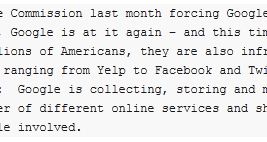Facebook Fesses Up To Being Behind Google Smear Campaign
Earlier this week it was revealed that a top PR firm was, on behalf on an unnamed client, testing the waters of the blogosphere, trying to find writers to post anti-Google items with promises of getting that content linked on bigger sites. Now a new report on The Daily Beast confirms that the folks at Facebook were the ones behind the attempted smear campaign.
The Beast’s Dan Lyons says that he confronted a Facebook rep with evidence of the social media giant’s involvement and that the spokesman confirmed it had hired the PR firm. Facebook’s reasoning was twofold, writes Lyons:
First, because it believes Google is doing some things in social networking that raise privacy concerns; second, and perhaps more important, because Facebook resents Google’s attempts to use Facebook data in its own social-networking service.
The attempted smear campaign was first reported by USA Today. According to that story, the PR firm was pitching news items about privacy concerns surrounding a Gmail feature called Social Circle, which allows Gmail users to see info about friends of friends, or “secondary connections.”
When blogger Chris Soghoian was pitched the anti-Google editorial piece, he asked the PR firm who their client was. When they declined to say, he published the entire letter here.
But Lyons calls Facebook’s stated concern over Social Circle’s privacy issues “a bit of a smokescreen,” saying that the likely reason for Facebook’s involvement in this mess is “that some of the stuff that pops up under ‘secondary connections’ in Google’s Social Circle is content pulled from Facebook.”
The problem we see with this gaffe is that, by trying to go cloak-and-dagger in its attempt to submarine Social Circle, Facebook has now tainted any serious investigation into privacy concerns about the functionality.
Facebook Busted in Clumsy Smear on Google [Daily Beast]
Want more consumer news? Visit our parent organization, Consumer Reports, for the latest on scams, recalls, and other consumer issues.


